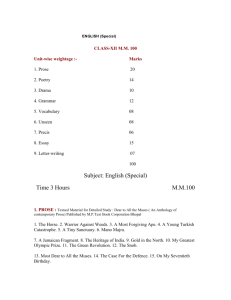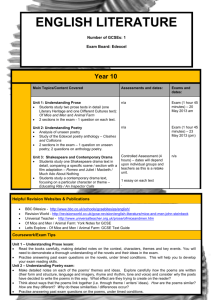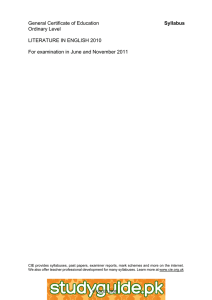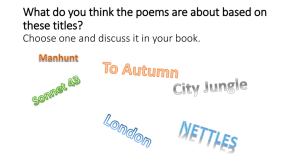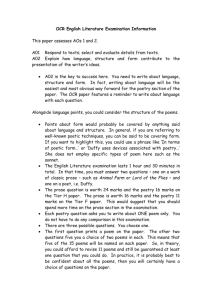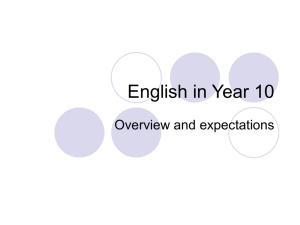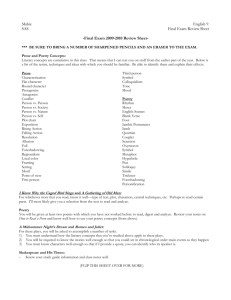Scheme of work – Cambridge IGCSE Literature (English) (0486) Unit 4: Unseen
advertisement
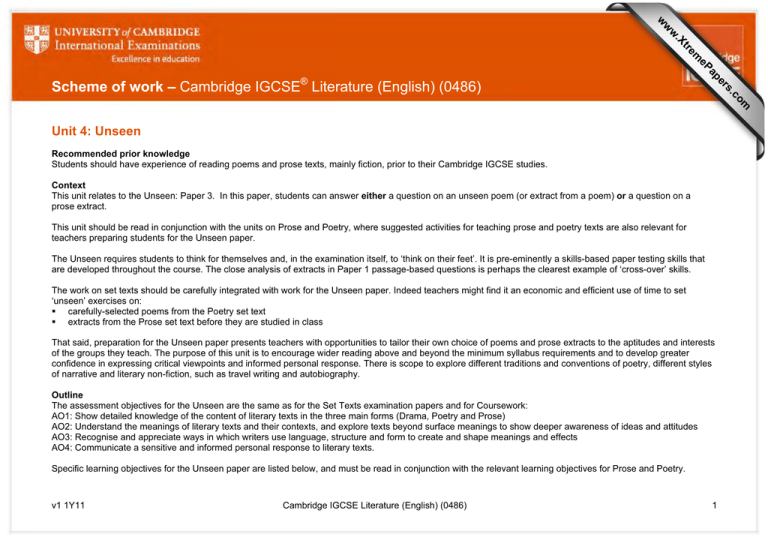
om .c s er ap eP m e tr .X w w w Scheme of work – Cambridge IGCSE® Literature (English) (0486) Unit 4: Unseen Recommended prior knowledge Students should have experience of reading poems and prose texts, mainly fiction, prior to their Cambridge IGCSE studies. Context This unit relates to the Unseen: Paper 3. In this paper, students can answer either a question on an unseen poem (or extract from a poem) or a question on a prose extract. This unit should be read in conjunction with the units on Prose and Poetry, where suggested activities for teaching prose and poetry texts are also relevant for teachers preparing students for the Unseen paper. The Unseen requires students to think for themselves and, in the examination itself, to ‘think on their feet’. It is pre-eminently a skills-based paper testing skills that are developed throughout the course. The close analysis of extracts in Paper 1 passage-based questions is perhaps the clearest example of ‘cross-over’ skills. The work on set texts should be carefully integrated with work for the Unseen paper. Indeed teachers might find it an economic and efficient use of time to set ‘unseen’ exercises on: carefully-selected poems from the Poetry set text extracts from the Prose set text before they are studied in class That said, preparation for the Unseen paper presents teachers with opportunities to tailor their own choice of poems and prose extracts to the aptitudes and interests of the groups they teach. The purpose of this unit is to encourage wider reading above and beyond the minimum syllabus requirements and to develop greater confidence in expressing critical viewpoints and informed personal response. There is scope to explore different traditions and conventions of poetry, different styles of narrative and literary non-fiction, such as travel writing and autobiography. Outline The assessment objectives for the Unseen are the same as for the Set Texts examination papers and for Coursework: AO1: Show detailed knowledge of the content of literary texts in the three main forms (Drama, Poetry and Prose) AO2: Understand the meanings of literary texts and their contexts, and explore texts beyond surface meanings to show deeper awareness of ideas and attitudes AO3: Recognise and appreciate ways in which writers use language, structure and form to create and shape meanings and effects AO4: Communicate a sensitive and informed personal response to literary texts. Specific learning objectives for the Unseen paper are listed below, and must be read in conjunction with the relevant learning objectives for Prose and Poetry. v1 1Y11 Cambridge IGCSE Literature (English) (0486) 1 AO Learning objectives Suggested teaching activities 1– 4 The learning objectives below should be read in conjunction with relevant learning objectives in the Prose and Poetry units. 1. Introduction a. build confidence in developing informed personal responses to a range of poems and prose extracts drawn from different genres b. annotate unseen extracts effectively, recognising this as an important stage of planning c. produce brief paragraph plans as the final stage of planning in order to encourage the writing of coherent arguments Teachers should check the rubric in the current syllabus and review a range of past papers to get a feel for the paper and the kinds of poems and prose extracts that have featured in papers. It will be observed that many poems or prose extracts are post-1900, but not all. Byron’s ‘When We Two are Parted’ has featured, for instance. Most prose extracts have been fiction, though non-fiction has also been set (e.g. travel writing by Bruce Chatwin). Learning resources Recent past papers & mark schemes for 0486 – Teacher Support website Assessment criteria – see mark schemes Recent examiner reports Teachers setting their own Unseen exercises should take note of the format of questions. They often begin with information about the context (e.g. the writer, time of writing, broad description of subject). The main question is followed by three bullet points which students ‘might consider’. The bullets relate to the content and also how the poem/passage is written. Students are not required to follow the bullets slavishly; they offer support. Of the 75 minutes for the Unseen paper, 20 minutes should be spent choosing their question, reading and annotating, and writing a brief plan. Teachers should provide opportunities for students to develop and refine their planning skills. Sometimes such an activity might lead to a group speaking activity only rather than to an extended writing exercise. At the early stage of planning it is useful also to read: mark schemes relevant pages of the examiner reports These documents can be found on the Teacher Support website. The assessment criteria, found in the mark schemes, is the generic one used for all other areas of the syllabus (but without the band descriptors for empathic responses). The examiners’ reports contain useful information about the performance of candidates, which should inform teachers’ lesson-planning. The reports make it clear what qualities of writing attract high reward. Towards the end of the course, teachers should schedule a mock paper, using a recent past paper. v1 1Y11 Cambridge IGCSE Literature (English) (0486) 2 AO Learning objectives Suggested teaching activities Learning resources 2. The Prose unseen Unit 1: Prose Teachers will in their course-planning need to work out at what points unseen Prose exercises might be most effectively integrated with work on the Prose set text. Activities should focus on developing the skills of close reading, from students’ initial impressions through to extended critical essays showing an informed personal response. It would be useful at this point to read relevant suggested teaching activities in the Prose Unit of the scheme of work. Past Prose Unseen questions – together with relevant mark schemes and examiners’ reports The selection of texts is important. Early activities might focus on students’ responses to short and more readily accessible prose extracts. Perhaps pair and small collaborative group work might be more appropriate at this stage to help build students’ confidence. The first couple of writing activities might require only a short piece of analytical writing that integrates brief quotation and pertinent critical comment. Stories of Ourselves Cambridge IGCSE Literature in English – Unit 7 on ‘Preparing for the Unseen Paper’ Then increasingly more challenging prose extracts (including extracts from literary non-fiction) should be introduced, especially during the last two terms. Speaking activities are as useful as writing activities in developing skills. Students should have opportunities to mark and evaluate their own and others’ work, using the marking grid. They should look for instances of: points which have not been developed points which have not been supported by textual reference quotations which are excessively long and lack focus quotations which do not lead to analytical comment This is good practice, which enables students to take responsibility for moving on their own and other’s learning. It engages students actively with the assessment process. Prose questions could be taken from past papers, but should be supplemented by questions devised by teachers. They might use extracts from unprepared stories in the Stories of Ourselves anthology, or a prose fiction extract of their own choice. Additionally, students should experience literary non-fiction: e.g. extracts from (auto)biography or travel writing. v1 1Y11 Cambridge IGCSE Literature (English) (0486) 3 AO Learning objectives Suggested teaching activities Learning resources Link with Prose set text The skills of close analysis required in the Unseen paper are practised in passage-based questions in the Set Texts paper. Activities should point out the connection explicitly. Teachers could, for example, use a couple of extracts from the Prose set text (before they are studied in class) as ‘unseen’ texts. 3. The Poetry Unseen Unit 3: Poetry Teachers will in their course-planning need to work out points at which unseen Poetry exercises might be most effectively integrated with work on the Poetry set text. Activities should focus on developing the skills of close reading, from students’ initial impressions through to extended critical essays showing an informed personal response. It would be useful at this point to read relevant suggested teaching activities in the Poetry unit. Cambridge IGCSE Literature in English – Unit 7 on ‘Preparing for the Unseen Paper’ The selection of poems is important. Early activities might focus on students’ responses to shorter and more readily accessible poems. Perhaps pair and small collaborative group work might be more appropriate at this stage to help build students’ confidence. The first couple of writing activities might require a short piece of analytical writing integrating brief quotation and pertinent critical comment. ed. Shapcott, J and Sweeney, M Emergency Kit (London 1996) Useful anthologies: ed. Heaney, S and Hughes, T The Rattle Bag (London 1982) Then increasingly more challenging poems or extracts from longer poems should be introduced, especially during the last two terms. Speaking activities are as useful as writing activities in developing skills. Students should have, for example, practice at reading poems aloud so that they can hear the sounds of words. Students should also have opportunities to mark and evaluate their own and others’ work, using the marking grid. They should look for instances of: points which have not been developed points which have not been supported by textual reference unproductive lists of poetic devices quotations which are excessively long and lack focus quotations which do not lead to analytical comment This is good practice, which enables students to take responsibility for v1 1Y11 Cambridge IGCSE Literature (English) (0486) 4 AO Learning objectives Suggested teaching activities Learning resources their own and other’s learning. It engages students actively with the assessment process. Poetry questions could be taken from past papers, but should be supplemented by questions devised by teachers. They could use poems in the Songs of Ourselves anthology, or poems of their own choice. Other suitable anthologies are suggested in the column to the right. Questions might be devised on poems for which there are audio recordings. The www.poetryarchive.org.uk website is an excellent resource here. Louis MacNeice’s ‘Prayer Before Birth’ is one of the many useful poems found on the website. Click here: www.poetryarchive.org/poetryarchive/singlePoet.do?poetId=1559 Songs of Ourselves This type of work might help to explore the specific form of poetry and the poet at work early in the course and/or to consolidate work on the exploration of poetry later in the course. Teachers could set extension activities which involve students researching a poet on the above website and, if time is available, making a short presentation on a particular poem, discussing what they like about the poem. Notes for Teachers on Poetry Anthology - on the Cambridge website under IGCSE Literature (English) – Resource list Speaking and listening work might involve students as member of a panel asked to award a poetry prize. They could construct speeches evaluating the strengths of particular poems and reasons for giving ‘their’ poem the prize. Suitable poetry anthologies: e.g. ed. Hydes, J, Touched With Fire 1985 Cambridge ed. Barlow, A, The Calling of Kindred 1993 Cambridge Link with Poetry set text www.poetryarchive.org The skills of close analysis required in the Poetry section of the Unseen paper are also developed in the study of the poems for the Poetry set text. Activities should point out the connection explicitly. Teachers could make economic use of their time by treating carefully-chosen poems from their Poetry set text as unseen poems. Teachers may in these circumstances judge that some words/phrases need to be glossed. v1 1Y11 Cambridge IGCSE Literature (English) (0486) 5


